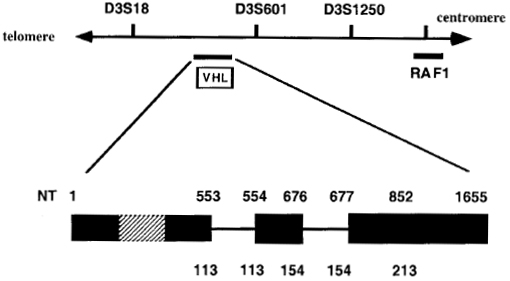|
Evolution & History
Diseases that involve many small mutations, such as cancer, are unlikely to suddenly crop up by chance. That is, the genetic aspect of a cancer does not result form a recent mutation, rather it is inherited. Analogous to the inheritance and evolution of complex features, a genetic disease slowly proliferates through an evolving species.
The gene responsible for pheochromocytoma (see genetics) exists as a missense mutation of the RET proto-oncogene on chromosome 10q11.2. More importantly, numerous base-pair substations occur on six different exons. Below, the diagram shows the mutant exons in VHL – a gene similar to MEN 2.

Pheochromocytoma has no known prevalence in other species. For this reason and the fact that this disease involves so many specific mutations, I propose that pheochromocytoma has only existed in humans.
|
